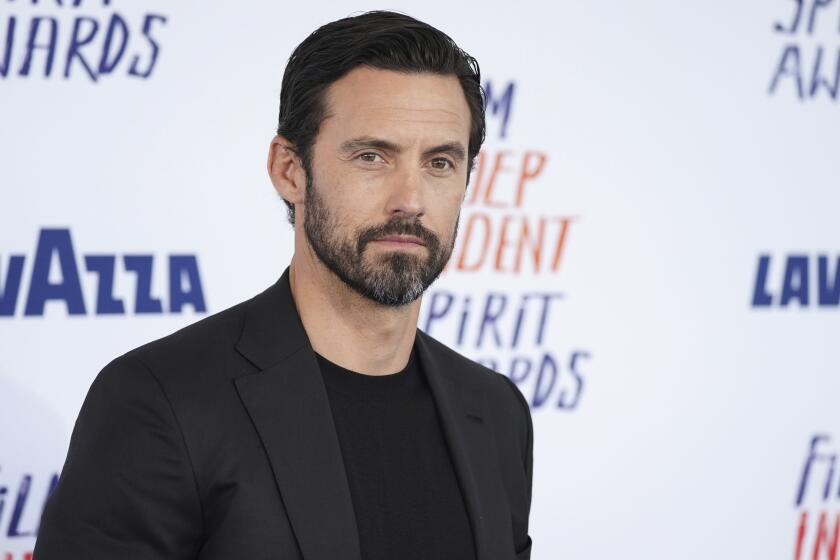A Race to Reverse a Subversion of Justice
- Share via
“I am just like a typical American,” former death row inmate Clarence Brandley, 51, says matter-of-factly, shortly before a Directors Guild of America screening of the movie based on his life. “If an issue didn’t affect me, I didn’t worry about it. But once I got into the situation I was in, then my eyes became more open to what was really going on and how the system actually works.”
The “system” that opened Brandley’s eyes taught him that justice can be not merely blind, but also dangerously dysfunctional--his harrowing 10-year descent into the depths of American criminal justice is laid bare in “Whitewash: The Clarence Brandley Story,” premiering Sunday on Showtime.
Airing less than a week after a bipartisan Illinois judicial commission recommended comprehensive changes in the way capital punishment is administered in that state, “Whitewash” investigates Brandley’s near-fatal encounter with the judicial system in his home state of Texas.
The troubles faced by Brandley, who is African American, began in 1980 when he was a high school maintenance supervisor overseeing an all-white team of janitors in his hometown of Conroe, Texas. That August, a white 16-year-old girl was found raped and strangled on school grounds, and he was promptly taken into custody. The arresting detective used a racial epitaph to tell Brandley that because he was African American, he was “elected.”
From that point on, his ordeal reads like a Kafka nightmare. The trial judge and prosecutor rehearsed their objections and rulings. Evidence was destroyed. The presiding judge complied with the request of a female court clerk and set Brandley’s execution date on her birthday. The federal judge who later reviewed the case wrote, “In the 30 years this court has presided over matters in the judicial system, no case has presented a more shocking scenario of the effects of racial prejudice, perjured testimony, witness intimidation, an investigation the outcome of which was predetermined, and public officials who, for whatever motives, lost sight of what is right and just.”
Directed by Tony Bill from a screenplay by Abby Mann, “Whitewash” tells its story at a deliberate pace with few emotional adornments. About the film’s spare style, Bill said, “I felt that the story was extremely compelling. I didn’t want to embellish it with any flashiness beyond the cold, hard facts. A great deal of the dialogue is taken directly from the court records. I felt that the style of the film should reflect the absolute truth to which we were trying to adhere.”
Mann, who won an Oscar for “Judgment at Nuremberg” (1961) and an Emmy for “Indictment: The McMartin Trial” (1995), has made a career of projects that explore complex issues of social, racial and legal injustice, and Brandley’s case had elements of all three. In 1987, Mann was contacted by crusading death-penalty foe Jim McCloskey, a former preacher whose work on behalf of Brandley and other controversial death-row defendants has been profiled on “60 Minutes.”
The case was already the focus of British journalist Nick Davies’ book “White Lies: Rape, Murder and Justice Texas Style” when McCloskey contacted Mann, who arrived just five days before Brandley was to be executed. According to Mann, McCloskey told him, “This is one of the most extraordinary cases because there isn’t a scintilla of evidence against this guy.”
Brandley’s plight attracted a panoply of authentic American characters. One of the most compelling was a Houston political activist and preacher with the unlikely name of Jew Don Boney Jr. Joining Brandley, Mann and their wives for a pre-screening interview in the lobby of a Westwood hotel, Boney (who is played by “Oz’s” Eamonn Walker) said he waged a 10-year campaign to free Brandley from death row.
“People have to understand that there were over 200 demonstrations, actions and civil disobedience to get Clarence Brandley a new trial so that new evidence and good, excellent lawyering could drive the truth home and ultimately exonerate him,” Boney said in the stentorian tones of a Southern Baptist preacher. “Clarence’s conviction was not a mistake. It wasn’t an accident.... He was the victim of a district attorney, a number of judges and law enforcement actually manufacturing evidence to railroad somebody that they knew they didn’t have the evidence to convict.”
Gil Bellows, of “Ally McBeal” and “The Agency,” plays Mike De Guerin, the unflappable defense attorney who manages to win Brandley’s freedom, and Courtney B. Vance, who co-stars in “Law & Order: Criminal Intent,” portrays Brandley.
“The piece is the process of his growing faith,” Vance said. “I knew that that’s the only way it could be played. And that’s the only way that that man could stay alive--anybody on death row. If you don’t have faith, you turn into an animal. He didn’t turn into an animal, so I knew he had faith.”
When asked if his experience has made him bitter, Brandley first spoke of the faith and people that sustained him, then added quietly, “Sure, I’m bitter. I’m a human being like anybody else. But I don’t let my bitterness get me in a position where I’m going to let it destroy me. Because then I would be locked up for something I did do.”
*
“Whitewash: The Clarence Brandley Story” premieres Sunday night at 8 on Showtime. The network has rated it TV-14-V-L-D (may be unsuitable for children under 14, with advisories for violence, coarse language and suggestive dialogue).
More to Read
The complete guide to home viewing
Get Screen Gab for everything about the TV shows and streaming movies everyone’s talking about.
You may occasionally receive promotional content from the Los Angeles Times.






